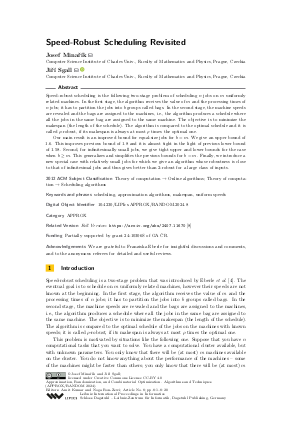Speed-Robust Scheduling Revisited
Authors
Josef Minařík,
Jiří Sgall 
-
Part of:
Volume:
Approximation, Randomization, and Combinatorial Optimization. Algorithms and Techniques (APPROX/RANDOM 2024)
Part of: Series: Leibniz International Proceedings in Informatics (LIPIcs)
Part of: Conference: International Conference on Approximation Algorithms for Combinatorial Optimization Problems (APPROX)
Part of: Conference: International Conference on Randomization and Computation (RANDOM) - License:
 Creative Commons Attribution 4.0 International license
Creative Commons Attribution 4.0 International license
- Publication Date: 2024-09-16
File

PDF
LIPIcs.APPROX-RANDOM.2024.8.pdf
- Filesize: 1 MB
- 20 pages
Document Identifiers
Related Versions
- Full Version https://arxiv.org/abs/2407.11670
Subject Classification
ACM Subject Classification
- Theory of computation → Online algorithms
- Theory of computation → Scheduling algorithms
Keywords
- scheduling
- approximation algorithms
- makespan
- uniform speeds
Metrics
- Access Statistics
-
Total Accesses (updated on a weekly basis)
0PDF Downloads0Metadata Views
Abstract
Speed-robust scheduling is the following two-stage problem of scheduling n jobs on m uniformly related machines. In the first stage, the algorithm receives the value of m and the processing times of n jobs; it has to partition the jobs into b groups called bags. In the second stage, the machine speeds are revealed and the bags are assigned to the machines, i.e., the algorithm produces a schedule where all the jobs in the same bag are assigned to the same machine. The objective is to minimize the makespan (the length of the schedule). The algorithm is compared to the optimal schedule and it is called ρ-robust, if its makespan is always at most ρ times the optimal one. Our main result is an improved bound for equal-size jobs for b = m. We give an upper bound of 1.6. This improves previous bound of 1.8 and it is almost tight in the light of previous lower bound of 1.58. Second, for infinitesimally small jobs, we give tight upper and lower bounds for the case when b ≥ m. This generalizes and simplifies the previous bounds for b = m. Finally, we introduce a new special case with relatively small jobs for which we give an algorithm whose robustness is close to that of infinitesimal jobs and thus gives better than 2-robust for a large class of inputs.
Cite As Get BibTex
Josef Minařík and Jiří Sgall. Speed-Robust Scheduling Revisited. In Approximation, Randomization, and Combinatorial Optimization. Algorithms and Techniques (APPROX/RANDOM 2024). Leibniz International Proceedings in Informatics (LIPIcs), Volume 317, pp. 8:1-8:20, Schloss Dagstuhl – Leibniz-Zentrum für Informatik (2024)
https://doi.org/10.4230/LIPIcs.APPROX/RANDOM.2024.8
BibTex
@InProceedings{minarik_et_al:LIPIcs.APPROX/RANDOM.2024.8,
author = {Mina\v{r}{\'\i}k, Josef and Sgall, Ji\v{r}{\'\i}},
title = {{Speed-Robust Scheduling Revisited}},
booktitle = {Approximation, Randomization, and Combinatorial Optimization. Algorithms and Techniques (APPROX/RANDOM 2024)},
pages = {8:1--8:20},
series = {Leibniz International Proceedings in Informatics (LIPIcs)},
ISBN = {978-3-95977-348-5},
ISSN = {1868-8969},
year = {2024},
volume = {317},
editor = {Kumar, Amit and Ron-Zewi, Noga},
publisher = {Schloss Dagstuhl -- Leibniz-Zentrum f{\"u}r Informatik},
address = {Dagstuhl, Germany},
URL = {https://drops.dagstuhl.de/entities/document/10.4230/LIPIcs.APPROX/RANDOM.2024.8},
URN = {urn:nbn:de:0030-drops-210010},
doi = {10.4230/LIPIcs.APPROX/RANDOM.2024.8},
annote = {Keywords: scheduling, approximation algorithms, makespan, uniform speeds}
}
Author Details
- Computer Science Institute of Charles Univ., Faculty of Mathematics and Physics, Prague, Czechia
Funding
Partially supported by grant 24-10306S of GA ČR.
Acknowledgements
We are grateful to Franziska Eberle for insightful discussions and comments, and to the anonymous referees for detailed and useful reviews.
References
- Susanne Albers. Algorithms for dynamic speed scaling. In Proc. of the 28th Int. Symp. on Theoretical Aspects of Computer Science, STACS 2011, volume 9 of LIPIcs, pages 1-11. Schloss Dagstuhl - Leibniz-Zentrum für Informatik, 2011. URL: https://doi.org/10.4230/LIPICS.STACS.2011.1.
- Bo Chen, André van Vliet, and Gerhard J. Woeginger. An optimal algorithm for preemptive on-line scheduling. Oper. Res. Lett., 18(3):127-131, 1995. URL: https://doi.org/10.1016/0167-6377(95)00039-9.
- Florian Diedrich, Klaus Jansen, Ulrich M. Schwarz, and Denis Trystram. A survey on approximation algorithms for scheduling with machine unavailability. In Jürgen Lerner, Dorothea Wagner, and Katharina Anna Zweig, editors, Algorithmics of Large and Complex Networks - Design, Analysis, and Simulation [DFG priority program 1126], volume 5515 of Lecture Notes in Computer Science, pages 50-64. Springer, 2009. URL: https://doi.org/10.1007/978-3-642-02094-0_3.
- Franziska Eberle, Ruben Hoeksma, Nicole Megow, Lukas Nölke, Kevin Schewior, and Bertrand Simon. Speed-robust scheduling: sand, bricks, and rocks. Math. Program., 197(2):1009-1048, 2023. A preliminary version appeared at 22nd IPCO, vol 12707 of LNCS, pages 283-296, Springer, 2021. URL: https://doi.org/10.1007/S10107-022-01829-0.
- Leah Epstein, Asaf Levin, Alberto Marchetti-Spaccamela, Nicole Megow, Julián Mestre, Martin Skutella, and Leen Stougie. Universal sequencing on an unreliable machine. SIAM J. Comput., 41(3):565-586, 2012. URL: https://doi.org/10.1137/110844210.
- Dorit S. Hochbaum and David B. Shmoys. A polynomial approximation scheme for scheduling on uniform processors: Using the dual approximation approach. SIAM J. Comput., 17(3):539-551, 1988. URL: https://doi.org/10.1137/0217033.
- Csanád Imreh and John Noga. Scheduling with machine cost. In Proc. of the 3rd Int. Workshop on Randomization and Approximation Techniques in Computer Science and 2nd Int. Workshop on Approximation Algorithms for Combinatorial Optimization Problems, RANDOM-APPROX'99, volume 1671 of Lecture Notes in Computer Science, pages 168-176. Springer, 1999. URL: https://doi.org/10.1007/978-3-540-48413-4_18.
- Josef Minařík and Jiřrí Sgall. Speed-robust scheduling revisited. arXiv e-prints, 2024. URL: https://arxiv.org/abs/2407.11670.
- Kirk Pruhs. Speed scaling. In Ming-Yang Kao, editor, Encyclopedia of Algorithms - 2016 Edition, pages 2045-2047. Springer, 2016. URL: https://doi.org/10.1007/978-1-4939-2864-4_390.
- Kirk Pruhs, Jirí Sgall, and Eric Torng. Online scheduling. In Joseph Y.-T. Leung, editor, Handbook of Scheduling - Algorithms, Models, and Performance Analysis. Chapman and Hall/CRC, 2004. URL: https://doi.org/10.1201/9780203489802.CH15.
- Clifford Stein and Mingxian Zhong. Scheduling when you do not know the number of machines. ACM Trans. Algorithms, 16(1):9:1-9:20, 2020. A preliminary version appeared at 29th SODA, pages 1261-1273, ACM, 2018. URL: https://doi.org/10.1145/3340320.
- David P. Williamson and David B. Shmoys. The Design of Approximation Algorithms. Cambridge University Press, 2011. URL: https://doi.org/10.1017/CBO9780511921735.
